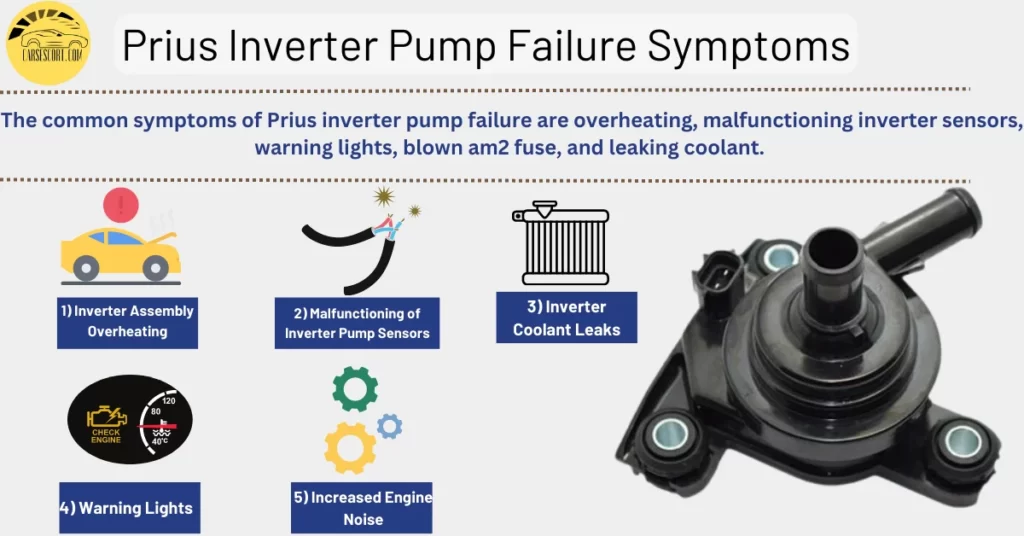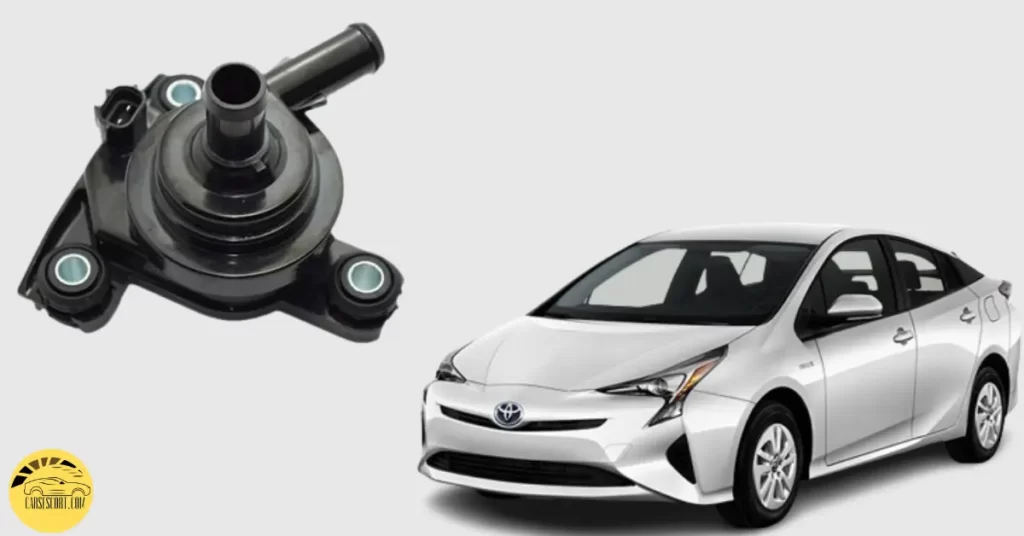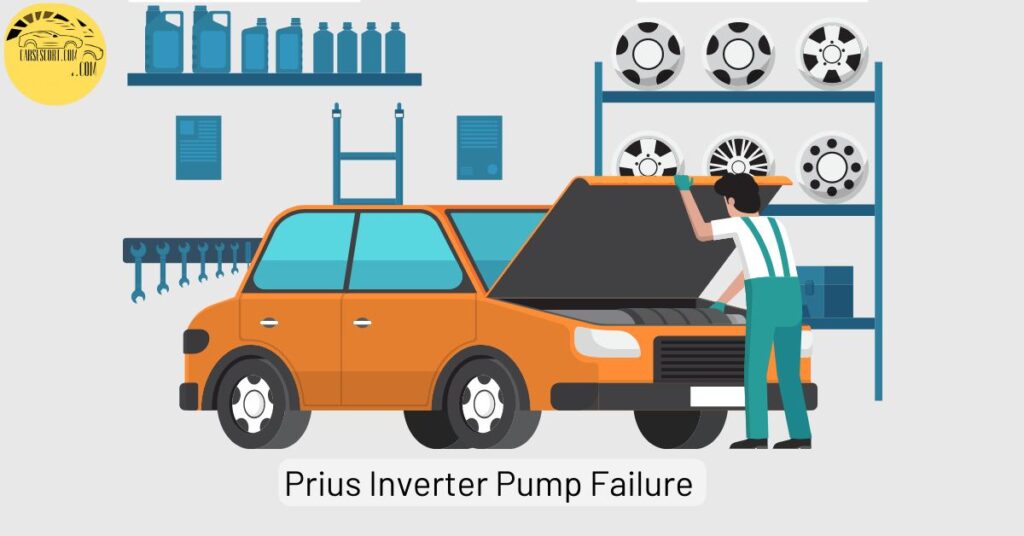The Toyota Prius has gained immense popularity as one of the pioneers in the hybrid vehicle market. However, like any mechanical device, the Prius is not immune to occasional issues. One particular component that can cause trouble is inverter pump failure.
So, what are the Prius Inverter Pump Failure Symptoms?
The common symptoms of Prius inverter pump failure are overheating, malfunctioning inverter sensors, warning lights, blown am2 fuse, and leaking coolant. Prius models 2003-2009 are more prone to this issue.
The Prius inverter pump function is circulating coolant to cool down the power electronics within the inverter assembly. When the inverter pump fails, it can lead to various symptoms that may indicate a problem.
Function of Inverter Pump
- The vehicle inverter pump circulates coolant or fluid through the inverter to keep it cool and prevent overheating.
- It ensures proper cooling of the power electronics within the inverter, which helps maintain their efficiency and prolong their lifespan.
- It aids in maintaining the optimal operating temperature of the inverter, which is crucial for its performance and overall vehicle efficiency.
- The pump assists in dissipating excess heat from the inverter during high-demand or heavy-load situations, ensuring reliable operation.
- It contributes to the overall thermal management system of the vehicle, maintaining proper temperature balance for efficient power conversion.
- The pump may have variable speed control to adjust coolant flow based on the inverter’s temperature and cooling requirements.
- It plays a vital role in hybrid and electric vehicles, where the inverter converts DC power to AC power, providing power to the electric motor.
- It enhances the overall reliability and durability of the vehicle’s electrical system by ensuring the inverter remains within its safe temperature range.
Prius Inverter Pump Failure Symptoms

1) Inverter Assembly Overheating
A failed inverter pump can result in the inverter assembly overheating, leading to an increase in the inverter’s temperature, potentially causing the vehicle to go into a reduced power mode or even a complete shutdown.
You may notice reduced performance, loss of power, or the vehicle entering a fail-safe mode to prevent further damage.
2) Malfunctioning of Inverter Pump Sensors
The inverter pump sensors play a crucial role in maintaining the optimal functioning of the Prius inverter. These sensors are strategically positioned around the inverter and its components to collect vital information.
This information is then transmitted to the main module of the Prius’ computer system. Based on the data received, the computer issues commands to the inverter pump, directing it to circulate coolant to cool down the inverter.
However, if these sensors fail to detect the rising temperature of the inverter, it can lead to a malfunction. In such cases, the inverter pumps will not receive the signal to initiate coolant circulation, resulting in inadequate cooling for the inverter.
3) Inverter Coolant Leaks
A failed inverter pump can sometimes lead to coolant leaks. If you notice coolant puddles or stains, it may indicate a leak in the inverter coolant system.
Coolant leaks should be addressed promptly to prevent further damage to the inverter assembly.
4) Warning Lights or Messages
When the inverter pump fails, it can trigger warning lights on the dashboard. The Check Engine Light (CEL), Hybrid Systems Warning Light, or other relevant warning lights may illuminate, indicating a problem with the inverter pump or the hybrid system.
Error codes related to the inverter pump may be stored in the vehicle’s onboard diagnostic system. The Error code P0A93 is mostly associated.
5) Increased Engine Noise
When the Prius inverter pump fails, the inverter assembly may overheat, leading to increased engine noise. This can be caused by the engine compensating for the lack of cooling from the pump by working harder to maintain proper temperatures.
Causes of Prius Inverter Pump Failure
Overheating
Inverter pumps rely on electronic components to control their operation. If the pump is subjected to high temperatures, these components can be overheated, resulting in their failure.
Overheating can be caused by inadequate cooling, poor ventilation, or operating the pump in an environment with high ambient temperatures.
Voltage Spikes or Surges
Inverters convert DC power to AC power, and during this conversion process, voltage spikes or surges can occur. These sudden increases in voltage can damage the sensitive electronics in the inverter pump, leading to failure.
Power Supply Issues
Inverter pumps require a stable and consistent power supply. Fluctuations or interruptions in the power supply can adversely affect the pump’s performance and potentially cause failure.
Common power supply issues include voltage drops, surges, and outages.
Electrical Faults
Inverter pump failures can also be caused by electrical faults within the pump system. This can include short circuits, open circuits, loose connections, or damaged wiring.
These faults can disrupt the flow of electricity, impacting the proper functioning of the inverter pump and leading to failure.
Inadequate Maintenance
Proper maintenance is crucial for the longevity and reliability of inverter pumps. Neglecting regular maintenance tasks, such as cleaning, lubrication, or inspection of components, can contribute to pump failure over time.
Dust accumulation, clogged filters, or worn-out bearings are some issues that can arise due to inadequate maintenance.
Component Wear and Tear
Inverter pumps have various mechanical and electrical components that can experience wear and tear over time. Continuous operation, exposure to harsh conditions, or excessive loads can cause components like bearings, seals, capacitors, or transistors to deteriorate.
Incorrect Installation or Sizing
Improper installation or incorrect sizing of the inverter pump system can also fail. If the pump is not installed correctly, it may be subjected to excessive vibrations, misalignment, or inadequate support, which can cause damage to the pump and its components.
Similarly, if the pump is undersized or oversized for the intended application, it can lead to premature failure.

You May Also Like To Read More About Your Prius:
Cons of Inverter Pump Failure
1) Overheating of the inverter assembly
Without the functioning inverter pump, the coolant circulation in the inverter assembly is compromised. This can lead to overheating of the inverter and can cause damage to its components and affect the overall performance of the hybrid system.
2) Reduced power and performance
Malfunctioning can result in the inverter assembly going into a reduced power mode or even a complete shutdown. This can lead to a significant loss of power and performance in the vehicle, affecting acceleration, speed, and overall drivability.
3) Increased risk of further damage
Overheating of the inverter assembly due to pump failure can have a cascading effect on other components. Excessive heat can cause damage to surrounding parts, such as electrical connectors, wiring, and even the inverter itself.
This can result in more extensive and costly repairs.
4) Poor fuel efficiency
The hybrid system may not operate optimally when the inverter pump fails. This can decrease fuel efficiency, meaning the vehicle will consume more fuel to cover the same distance. Lower gas mileage can lead to increased fuel costs over time.
5) Risk of breakdown or stranded
Inverter failure can lead to a vehicle breakdown if the overheating cause the hybrid system to shut down completely. This can leave you stranded on the road and require towing or roadside assistance to get the vehicle to a repair facility.
How To Fix Prius Inverter Pump Failure?
Check for overheating
Ensure the inverter pump has proper cooling and ventilation. Clean dust or debris that may be blocking the cooling system. Consider operating the pump in a cooler environment if the ambient temperature is high.
Address voltage spikes or surges
Install surge protectors or voltage stabilizers to safeguard the inverter pump against sudden increases in voltage. These devices can help regulate the power supply and prevent damage to the pump’s electronics.
Resolve power supply issues
Investigate the power supply to the inverter pump system. Check for voltage drops, surges, or outages affecting the pump’s performance. Consult an electrician if necessary to rectify any issues with the power supply.
Identify and fix electrical faults
Inspect the inverter pump’s electrical system for any faults, such as short circuits, open circuits, loose connections, or damaged wiring. Repair or replace any faulty components and ensure all connections are secure.
Perform regular maintenance
Establish a maintenance schedule for the inverter pump. Clean the pump regularly, especially the cooling system, and replace clogged filters.
Lubricate mechanical components as recommended by the manufacturer. Conduct periodic inspections to identify and address any potential issues early on.
Replace worn-out components
If you notice any signs of wear and tear on mechanical or electrical components, such as bearings, seals, capacitors, or transistors, consider replacing them. Over time, these components may deteriorate and affect the pump’s performance.
Verify installation and sizing
Ensure the pump is installed correctly and securely. Check for any excessive vibrations, misalignment, or inadequate support.
If the pump was incorrectly sized for the intended application, consider consulting with a professional to determine the appropriate pump size and make any necessary adjustments.
Prius Inverter Pump Replacement Cost
On average, Prius inverter pump replacement costs between $400 and $800 to replace the inverter pump.
However, the cost of replacing the inverter pump in a Toyota Prius can vary depending on several factors, including the location, the specific model year, and whether you choose to have the replacement done at a dealership or by yourself.
Prius Inverter Pump Recall
The Prius inverter pump recall pertains to specific model years 2004-2009 Prius vehicles manufactured between August 6, 2003, and March 30, 2009, and FCHV-adv vehicles manufactured from December 12, 2008, to September 13, 2011, by Toyota.
According to the Toyota manufacturer, a scratch may have occurred inside the electrically driven water pump’s coil wire during manufacturing. This scratch can lead to corrosion in the affected area.
The corrosion of the coil wire can result in its breakage, causing the water pump to cease functioning. Furthermore, the corroded coil wire could create a short circuit between the wires, leading to an open AM2 fuse.
This can result in a stall-like situation in the hybrid system while the vehicle is in operation, thereby increasing the risk of a vehicle crash.
FAQ
How do I know if my Prius inverter pump is bad?
To determine if your Prius inverter pump is bad, look for symptoms such as overheating, coolant leaks, unusual noises, or a malfunctioning hybrid system.
Can you drive with a bad inverter pump?
Driving a car with a bad inverter pump is not advisable as it can further damage the hybrid system. Operating the vehicle without a functioning inverter pump can cause overheating and irreversible damage.
Does the inverter damage the car battery?
The inverter itself does not directly damage the car battery. However, if the inverter pump fails, it can result in overheating of the inverter, which may cause stress on the hybrid battery. Overheating can lead to reduced battery life or other battery-related issues.
How do I know if my Prius water pump is bad?
Signs of a bad Prius water pump include coolant leaks, engine overheating, unusual noises from the engine compartment, and a malfunctioning hybrid system. A professional diagnostic test can definitively assess the water pump’s condition.
Affiliate Disclosure: Cars Escort is a participant in the Amazon Services LLC Associates Program. As an Amazon Associate, we earn from qualifying purchases made through affiliate links on our site. Read Our Disclaimer .

